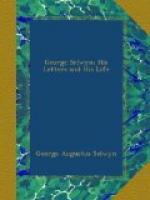Lord C. sets out you say on Monday next; then I shall see him, I suppose, on Wednesday; he will not hurry up as he did down, and then I am afraid I shall hardly get access to him. Charles you know is come; I have not heard anything more of him. The papers say that Pitt and the Chan(cell)or(244) went to Windsor together in one chaise, and he and Dr. Graham(245) in another. I want to know, how he has relished Sheridan’s(246) beginning a negotiation without him. I have figured him, if it be true, saying to him, at his arrival, as Hecate does to the Witches in Macbeth, “Saucy and (over) bold, how did you dare to trade and traffic, &c., and I, the mistress of your charms, the close contriver of all harms, was never called to bear my part,” &c. I will not (go) on to the rest of the passage,(247) for fear of offending. I hope that I shall not have offended you by anything which I have said; if I do not, you shall hear from me as often as you please. Be only persuaded that I am most truly and devotedly yours.
(237) The question of the Regency during the King’s illness.
(238) Thomas Gilbert (1720-1798); known for his reform of the poor laws.
(239) The Prince of Wales. ||’
(240) Duke of Queensberry, who at this juncture, though a member of the King’s Household, markedly allied himself with the Prince of Wales’s party.
(241) Second son of Lord Carlisle, born December 25, 1781, died January 25, 1843.
(242) Third son of Lord Carlisle, Major 10th Hussars, killed at Waterloo.
(243) Lord Carlisle’s town residence’
(244) Lord Thurlow.
(245) Dr. Graham (1745-1794); a noted quack doctor. Returning from America, he claimed to have learned marvellous electrical cures from Franklin, and advertised impossible discoveries; he declared he could impart the secret of living beyond the natural span of life. He became fashionable, received testimonials from many well-known persons, and occupied part of Schomberg House, Pall Mall, where Gainsborough had his studio.
(246) Richard Brinsley Sheridan (1751-1816).
(247) “Or show the glory of our art?
And, which is worse, all you have done
Hath been but for a wayward son,
Spiteful and wrathful, who, as others do,
Loves for his own ends, not for you.”
(Act 3, scene 5.)
(1788, Dec. 4?) Thursday morning.—I begin my letter to you this morning, and at an early hour, before I can have been informed of anything, but I do so to shew you that I am impatient to obey your commands, and that I intend to write to you as often as I can pick up anything which I think will interest or amuse you; in which I shall not forget that George and Caroline are now of an age to take some parts in public affairs. What is of a more solemn and profound nature and secrecy, such as the deliberations of the Cabinet, that you will learn from those who will relate them to you with more precision and authenticity.




